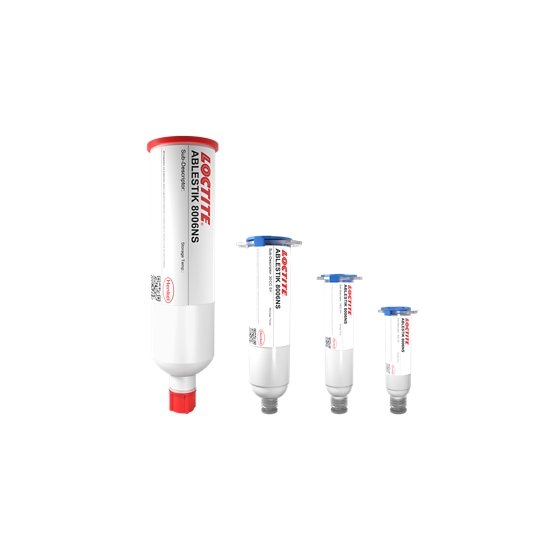LOCTITE ABLESTIK 8006NS
Harmonization Code : 3506.10.00.00 | Prepared glues and other prepared adhesives, not elsewhere specified or included; products suitable for use as glues or adhesives, put up for retail sale as glues or adhesives, not exceeding a net weight of 1 kg
Main features
- B-stageable
- Smaller die sizes
- Improved printability
Product Description
LOCTITE ABLESTIK 8006NS non-conductive die attach adhesive has been formulated for use in high throughput die attach applications. This product is designed for application by stencil or screen printing.
LOCTITE ABLESTIK 8006NS can be applied to a wafer backside by stencil printing and then B-staged in an oven. Once B-staged, this adhesive remains stable and can be placed into storage for several months. With proper die bonder setup along with incorporating adequate die placement pressure, a consistent minimum bondline thickness of 1mil can be achieved with minimal die tilt. It is more suitable for smaller die applications.
B-stage cure
- 1 hour @100°C
Cure Schedule
- 2 hours @160°C
Technical Specifications
| General Properties | |
| Work life @25°C Work life @25°C Work life is the amount of time we have to work with a material until it is no longer able to be easily worked and applied on a substrate. It is based on the change in viscosity and it can rely on the application requirements. | 24 hours |
| Thermal Properties | |
| Thermal Conductivity Thermal Conductivity Thermal conductivity describes the ability of a material to conduct heat. It is required by power packages in order to dissipate heat and maintain stable electrical performance. Thermal conductivity units are [W/(m K)] in the SI system and [Btu/(hr ft °F)] in the Imperial system. | 0.44 W/m.K |
| Physical Properties | |
| Thixotropic index Thixotropic index Thixotropic Index is a ratio of a material s viscosity at two different speeds in Ambient temperature, generally different by a factor of ten. A thixotropic material s viscosity will decrease as agitation or pressure is increased. It indicates the capability of a material to hold its shape. Mayonnaise is a great example of this. It holds its shape very well, but when a shear stress is applied, the material easily spreads. It helps in choosing a material in accordance to the application, dispense method and viscosity of a material. | 1.3 |
| Viscosity Viscosity Viscosity is a measurement of a fluid’s resistance to flow. Viscosity is commonly measured in centiPoise (cP). One cP is defined as the viscosity of water and all other viscosities are derived from this base. MPa is another common unit with a 1:1 conversion to cP. A product like honey would have a much higher viscosity -around 10,000 cPs- compared to water. As a result, honey would flow much slower out of a tipped glass than water would. The viscosity of a material can be decreased with an increase in temperature in order to better suit an application | 55,000 mPa.s |



